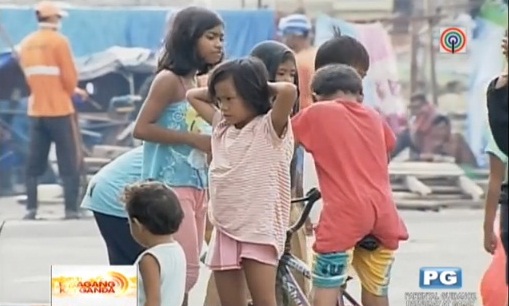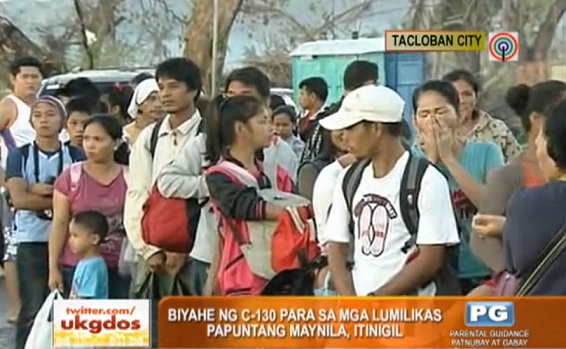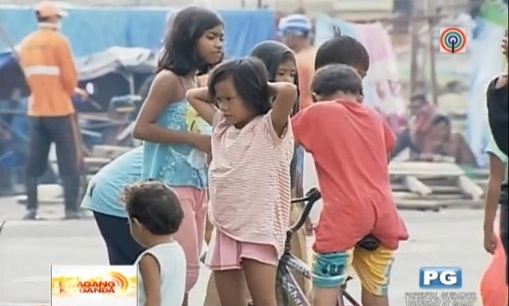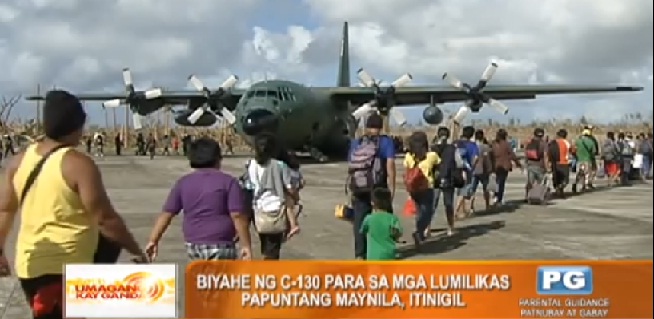By ELLEN TORDESILLAS
Photos from ABS-CBN video
 WHAT has been feared by human rights advocates is now happening in Tacloban: human trafficker vultures are on a prowl preying on the hapless victims of typhoon Yolanda.
WHAT has been feared by human rights advocates is now happening in Tacloban: human trafficker vultures are on a prowl preying on the hapless victims of typhoon Yolanda.
ANC had a report of a human trafficking attempt in Tacloban. DSWD Assistant Secretary Cheche Cabrera related about two cases which they were able to stop. “A very beautiful girl was escorted by two burly looking guys,” she said.
Cabrera said together with the International Organization for Migration and the United Nations, they are setting up a desk in Tacloban City, Ormoc and Guiuan, Eastern Samar. “There are lots of possibilities where very young girls will be trafficked,” she said.
DSWD is also coordinating with the Philipine Air Force which is offering free transport through C-130 of refugees to Manila and the Philippine Navy through their ships to be alert in the screening of passengers. Priority is given to the highly vulnerable – those with very young children, pregnant women, persons with disability and seniors. Kapag delikado at hindi makakasagot sa assessment hindi ire-recommend sa C-130, Navy or even the buses,” Cabrera said.
Last weekend, VERA Files conducted a seminar-training for journalists on Human Trafficking in cooperation with the United States Embassy and the Embassy of Canada in Manila.
In his presentation, Ricardo R. Casco, IOM national program coordinator officer and mission coordinator, shared the observation that disastrous calamities, like what happened in Leyte and Samar and much earlier in Bohol and Cebu, heighten vulnerabilities to trafficking.
 “Quickly after realization of calamity damage to homes, property,livelihood and infrastructure, victims of both gender and working age including the youth, are likely to migrate internally and internationally as a coping mechanism to and succumb to unverified job offers,” he said.
“Quickly after realization of calamity damage to homes, property,livelihood and infrastructure, victims of both gender and working age including the youth, are likely to migrate internally and internationally as a coping mechanism to and succumb to unverified job offers,” he said.
Another speaker, Lucille Dejito, special counsel for Interventions, International Justice Mission, and Cebu said they observed that in the aftermath of typhoon Sendong that devastated parts Mindanao of December 2011, there was a spike of of requests for birth certificates and application for passports.
Human trafficking is modern-day slavery.
Republic Act 9208 known as the Anti-Trafficking in Persons Act of 2003″ defines human trafficking as “the recruitment, transportation, transfer or harboring, or receipt of persons with or without the victim’s consent or knowledge, within or across national borders by means of threat or use of force, or other forms of coercion, abduction, fraud, deception, abuse of power or of position, taking advantage of the vulnerability of the person, or, the giving or receiving of payments or benefits to achieve the consent of a person having control over another person for the purpose of exploitation which includes at a minimum, the exploitation or the prostitution of others or other forms of sexual exploitation, forced labor or services, slavery, servitude or the removal or sale of organs.”
Casco said human trafficking is the world’s third largest criminal enterprise generating $15 billion last year alone- behind only to international drug and arms trades.
The Philippines is a source country and to a certain extent the destination and transit country for men, women and children subjected to sex trafficking and forced labor.
Casco said a significant number of Filipino men and women who migrate for work abroad are subsequently subjected to conditions of involuntary servitude.
He said findings reveal that 90 percent from the almost 4,000 repatriated OFWs were irregular or undocumented having fake passports and 90 percent of them are potential trafficking victims.
Persons are trafficked for a variety of reasons including debt bondage, forced labor, pornography, prostitution, removal or sale of organs, sex tourism, sex exploitation and others.
An official of the British government, an aide to Justine Greening, Britain’s international development secretary, who is helping to coordinate the UK’s response to the crisis caused by typhoon Yolanda which struck parts of Visayas last Nov. 8, expressed concern “about the safety of women and girls in the Philippines.”
“After previous emergencies in the Philippines, we have seen an increase in violence against women and girls and in particular the trafficking of girls,” the British official said.
The British official recommended sending a women’s ‘protection specialist’.
It is also useful to make the environment not conducive to human traffickers to operate like lighting up the place. But how about in places devastated by Yolanda where power has not been restored?
The British official recommended solar lanterns with built-in mobile phone chargers for remote and vulnerable communities, used in other countries like India which also experienced devastation caused by a cyclone.
Casco said officials and concerned individuals should watch out for indications of increase in the requests for birth certificate and passports without special government-facilitated employment assistance.

